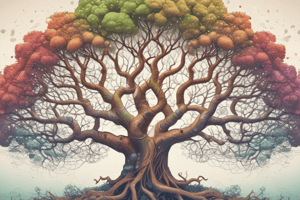Podcast
Questions and Answers
What is the study of the interactions between organisms and their environment?
What is the study of the interactions between organisms and their environment?
- Botany
- Ecology (correct)
- Microbiology
- Biotechnology
What is the term for the genetic makeup of an individual?
What is the term for the genetic makeup of an individual?
- Genome
- Genotype (correct)
- Phenotype
- Trait
What is the purpose of the cell membrane?
What is the purpose of the cell membrane?
- To synthesize proteins
- To regulate what enters and leaves the cell (correct)
- To provide structure to the cell
- To produce energy for the cell
What is the term for the process by which new species emerge?
What is the term for the process by which new species emerge?
What is the term for the complex network of food chains?
What is the term for the complex network of food chains?
What is the term for the molecules that contain genetic information?
What is the term for the molecules that contain genetic information?
What is the term for the region of the Earth where life exists?
What is the term for the region of the Earth where life exists?
What is the term for the study of microorganisms?
What is the term for the study of microorganisms?
Flashcards are hidden until you start studying
Study Notes
Branches of Biology
- Botany: study of plants
- Zoology: study of animals
- Microbiology: study of microorganisms
- Ecology: study of interactions between organisms and their environment
- Biotechnology: application of biological principles to develop new products and technologies
Cell Biology
- Cell: basic unit of life
- Cell membrane: semipermeable membrane that surrounds the cell
- Cytoplasm: jelly-like substance inside the cell membrane
- Nucleus: contains genetic material (DNA)
- Organelles: specialized structures within the cell (e.g. mitochondria, ribosomes)
Genetics
- Genes: units of heredity that carry information from one generation to the next
- DNA: double helix structure that contains genetic information
- Chromosomes: thread-like structures that carry genes
- Genotype: genetic makeup of an individual
- Phenotype: physical characteristics of an individual
Evolution
- Theory of Evolution: process by which species change over time
- Natural Selection: mechanism by which species adapt to their environment
- Speciation: process by which new species emerge
- Fossil Record: evidence of past life on Earth
Biological Molecules
- Carbohydrates: energy-rich molecules (e.g. sugars, starches)
- Proteins: molecules that perform a wide range of functions (e.g. enzymes, hormones)
- Lipids: molecules that provide energy and structure (e.g. fats, oils)
- Nucleic Acids: molecules that contain genetic information (e.g. DNA, RNA)
Ecosystems
- Ecosystem: community of living and nonliving components interacting with each other
- Biosphere: region of the Earth where life exists
- Biome: large region of the Earth with a specific climate and vegetation
- Food Chain: sequence of organisms that eat other organisms
- Food Web: complex network of food chains
Branches of Biology
- Botany is the study of plants
- Zoology is the study of animals
- Microbiology is the study of microorganisms
- Ecology is the study of interactions between organisms and their environment
- Biotechnology is the application of biological principles to develop new products and technologies
Cell Biology
Cell Structure
- Cell is the basic unit of life
- Cell membrane is a semipermeable membrane that surrounds the cell
- Cytoplasm is a jelly-like substance inside the cell membrane
- Nucleus contains genetic material (DNA)
Cell Components
- Organelles are specialized structures within the cell (e.g. mitochondria, ribosomes)
Genetics
Genetic Information
- Genes are units of heredity that carry information from one generation to the next
- DNA is a double helix structure that contains genetic information
- Chromosomes are thread-like structures that carry genes
Expression of Genetic Information
- Genotype is the genetic makeup of an individual
- Phenotype is the physical characteristics of an individual
Evolution
Mechanisms of Evolution
- Theory of Evolution is the process by which species change over time
- Natural Selection is the mechanism by which species adapt to their environment
Evidence for Evolution
- Speciation is the process by which new species emerge
- Fossil Record is evidence of past life on Earth
Biological Molecules
Carbohydrates
- Carbohydrates are energy-rich molecules (e.g. sugars, starches)
Proteins
- Proteins are molecules that perform a wide range of functions (e.g. enzymes, hormones)
Lipids
- Lipids are molecules that provide energy and structure (e.g. fats, oils)
Nucleic Acids
- Nucleic Acids are molecules that contain genetic information (e.g. DNA, RNA)
Ecosystems
Ecosystem Components
- Ecosystem is a community of living and nonliving components interacting with each other
- Biosphere is the region of the Earth where life exists
- Biome is a large region of the Earth with a specific climate and vegetation
Energy Flow
- Food Chain is a sequence of organisms that eat other organisms
- Food Web is a complex network of food chains
Studying That Suits You
Use AI to generate personalized quizzes and flashcards to suit your learning preferences.




